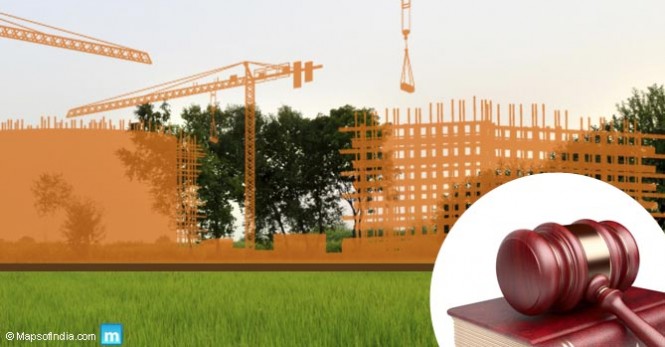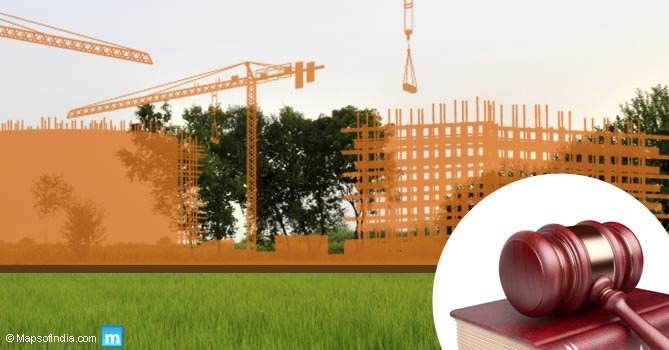 Vacant land is always required both by private as well as public sector in rural and urban areas. But what about the compensation for acquiring the land? This main concern of the government resulted in the Right to Fair Compensation and Transparency in Land Acquisition, Rehabilitation and Resettlement Bill 2013 that was passed by the Parliament. It is a new land acquisition Bill that looks very difficult but beneficial. The bill replaced the Land Acquisition Act of 1894. The new Bill is all about the way the land is to be acquired and compensation to be made in India. Objective of the new Bill is fair compensation which can be through resettlement and rehabilitation and transparency in the entire process of acquiring a land. Earlier bill was meant just to acquire the land not rehabilitation. (Titles of the Bill say it all). The new Bill was the need of the day to stop the forceful acquisition of the land, to safeguard the interest of the affected families and to redefine the rates of compensation.
Vacant land is always required both by private as well as public sector in rural and urban areas. But what about the compensation for acquiring the land? This main concern of the government resulted in the Right to Fair Compensation and Transparency in Land Acquisition, Rehabilitation and Resettlement Bill 2013 that was passed by the Parliament. It is a new land acquisition Bill that looks very difficult but beneficial. The bill replaced the Land Acquisition Act of 1894. The new Bill is all about the way the land is to be acquired and compensation to be made in India. Objective of the new Bill is fair compensation which can be through resettlement and rehabilitation and transparency in the entire process of acquiring a land. Earlier bill was meant just to acquire the land not rehabilitation. (Titles of the Bill say it all). The new Bill was the need of the day to stop the forceful acquisition of the land, to safeguard the interest of the affected families and to redefine the rates of compensation.
Public and private partnership resulted in more demand for land and thus the regulations of acquiring it. The new Bill was passed because the Land Acquisition Act 1894 had many flaws. According to the previous law, the land could be acquired forcefully regardless of the affected person, the law was silent as far as rehabilitation and resettlement of the affected persons was concerned, urgency clause was not defined properly so almost all the cases of acquiring land were under this clause, and compensation rates were too low.
Highlights of the Right to Fair Compensation and Transparency in Land Acquisition, Rehabilitation and Resettlement Bill 2013
This is the first law that deals with both acquisition and rehabilitation. The Bill will make sure of the rehabilitation of the family whose land is being acquired for making factories or other infrastructural project. Affected families must be rehabilitated and resettled.
The Bill is retrospective in nature. This means it will be applicable to the cases where land was acquired earlier and no compensation had been paid. The entire land acquisition process will take place according to the new provisions if the land acquisition has taken place five years ago without compensation or land possession.
It is a known fact that circle rates are often miscalculated or inaccurate at times. To balance this, if the land is acquired in rural areas then the compensation will be four times more than the circle rate and if acquired in urban areas then it will be two times more than that. For circle rate, average sale price for the last three years or last three months (which so ever will be higher) will be considered.
For land acquisition, local Panchayati Raj institutions and monitoring committee at the national and state levels will play their roles. They will make sure that all the obligations are met according to the said clause and provisions.
The Gram Sabhas will provide sanction in case the land is in scheduled areas. This has been provided to safeguard the rights of tribal communities and disadvantaged groups.
Without providing proper alternative sites for rehabilitation and resettlement no one can be evicted.
In case the project is for Public private partnership then minimum of 70% consent and in case the land acquisition is for private companies then 80% consent of affected people is required. This is to stop the forcible acquisition of the land.
State must impose the limits on the area under agricultural cultivation
In case the land is not utilized then it must be returned back either to the original owner or to the State Land Bank.
In case the land is sold at higher price to the third party, then 40% of the profit must be shared with the original land owner.
How farmers are benefitted?
Certain provisions such as retrospective effect, consent of the majority, return of unutilized land, share in profit if the land is sold to the third party at higher price, income tax exemption, protecting fair price, any damage to the crop to be included in the price and acquisition only if required are the associated benefits.
Rehabilitation and resettlement provisions in the Bill
In case the affected families have been living on the land to be acquired for the past five years then they are entitled to a house. They can also have one time financial grant instead of a house. Affected family can either accept a job or annuity. In case there is no employment then they are entitled to receive Rs 5 lakh per family. Apart from this they are benefitted with the Subsistence allowance, Training and skill development, One-time financial assistance etc.
How it is beneficial for schedule caste and schedule tribes?
For tribal people as well as for the people belonging to schedule caste, separate chapter in the Bill has been written. It is said that if acquisition is required then their land should be the last resort. First of all no acquisition should be made in the Scheduled Areas and if at all it is required then it needs approval/ consent of the local institutions of self-governance. It must be accompanied by a complete development plan. One third of the compensation must be paid as first installment to the affected families. If possible then these families must be rehabilitated in the same area, may be in a compact block, so that their originality can be retained.
Criticism of Land Bill
This bill will increase the cost of the land making most of the projects unviable. Also it will increase the land acquiring time. The Bill is in the favor of land owners but not in the poor strata of the society who need affordable housing.
In case of urgency, the government can acquire a land by ignoring all the pre-set conditions. For this the Bill has an urgency clause.
It is possible that compensation calculated might be less than market rate as compensation is not aligned to the loss but to the category.
Railways, highways, defence, nuclear projects, low cost housing and industrial area or parks are exempted from some of the clauses and act of the bill.
Projects may be delayed by affected families for additional compensation.
Read more:
Land Acquisition Laws in India and the Duplicitous Deals




